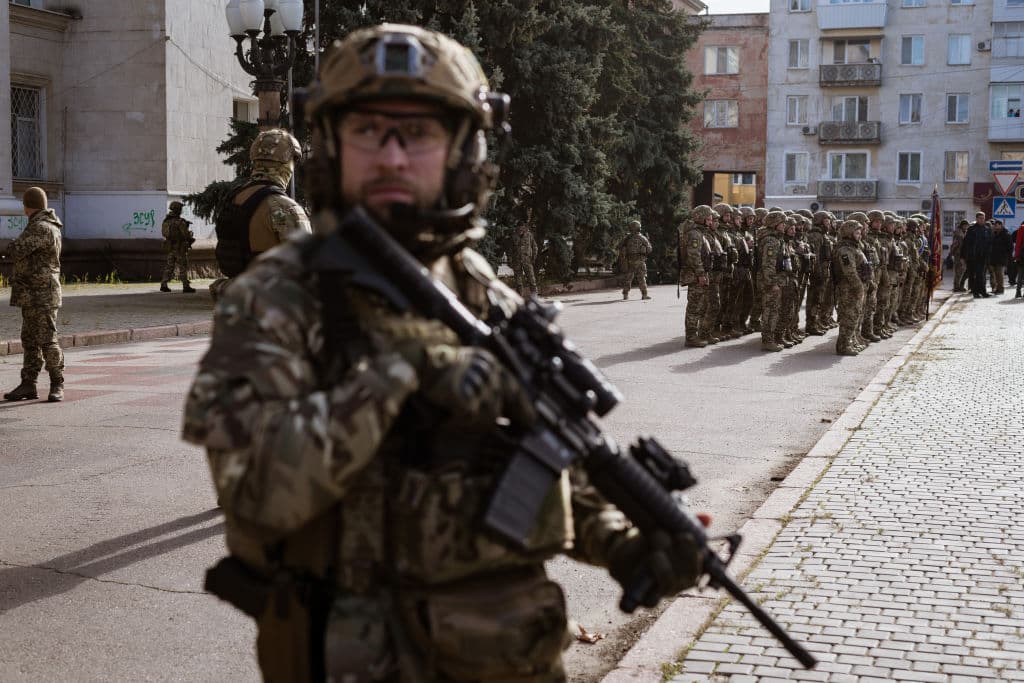Editor’s note: The Kyiv Independent asked Michael Kofman, military analyst and Research Program Director in the Russia Studies Program at CNA, to comment on what retaking Kherson means for the future of the war. Watch Michael Kofman speak at the panel discussion that took place in Kyiv on Oct. 25: "War and Storytelling in Ukraine."

Michael Kofman
The Kyiv Independent: Now that the Ukrainian forces have retaken Kherson, what prospects does it open for the counteroffensive? How can Ukraine use this momentum?
Michael Kofman: I think Ukraine has the initiative, and from the standpoint of morale it does have momentum. Ukraine may now shift the bulk of the forces there to a different front, but they likely need rest and refit. The fighting in Kherson was grinding and costly.
As winter approaches, November and December in particular are difficult months to conduct offensives. Russian forces will seek to entrench for the winter, using the Dnieper (Dnipro River) as a natural defensive barrier in the south. In the east their position remains vulnerable, trying to retain a defensive line between Troitske, Svatove, Kreminna. It may be smart for Ukraine to keep pushing now, before mobilization can increase Russian manpower availability in 3-4 months, but weather conditions and force availability may make that unsound. The short answer is, it depends.
Ukraine can take advantage of new positions, moving up HIMARS systems, to range ~70km into Kherson. This will allow them to steadily eat away at Russian forces there, perhaps setting up a southern advance in Zaporizhia (Oblast) later on. However, I suspect the river will serve to shift operations east.
The Kyiv Independent: Do you think that we can expect any more territorial gains for the Ukrainian forces soon? Or does taking Kherson mean that everything else will come much more difficult?
Michael Kofman: Generally, yes, but doubtfully on the scale seen in Kharkiv and Kherson. I expect there will be gains, just that these may come at a slower pace. I think there are opportunities in Luhansk (Oblast), but in general I suspect that future offensives are likely to be against a more consolidated Russian force with less territory to defend. Kherson was not an easy battle, and after Kherson offensives are likely to be just as difficult, if not more so. But it depends. Russia may face shortage of ammunition, and experience morale problems with mobilized personnel over the course of the winter.
The Russian goal seems to be to entrench and defend for the next several months, try to reconstitute the force, and then attempt a new offensive in the Donbas in 2023. Ukraine can disrupt this process by keeping up pressure over the winter. I'm skeptical that Russia can restore offensive potential, but they may be able to extend the war. Depends on the net effect of mobilization and the extent to which Ukraine receives sustained material assistance from the West.
The Kyiv Independent: What effect can retreat from Kherson have on the Russian military?
Michael Kofman: Defeat is never good for morale, but the situation in Kherson was different from Izyum and Lyman. It was an organized retreat, not a rout as we saw in Izyum, with high casualties, and stores of equipment abandoned. Russia appears to have withdrawn the bulk of their remaining forces and equipment. Although more evidence will be available in the coming week to better judge what happened. This is just an initial impression. Unfortunately that means Ukraine will have to face them again, perhaps in a campaign east of the Dnieper.
The Russian military didn't leave unscathed, but nonetheless, it left in an organized fashion over the course of weeks. Hence Kherson is a significant victory, but Ukraine's approach suggests a tradeoff was made between trying to prevent the Russian withdrawal, and avoiding a costly battle for the city of Kherson. This strategy preserved Ukrainian forces for future offensives, and did not entail destroying the city. Overall, I think that strategy was quite sound, and reflected better on Ukrainian military leadership when compared to Russian commanders who often choose to throw away the lives of their own men.
The Kyiv Independent: Do you think that Russians conducted the retreat from Kherson in a way that is optimal for the regime’s political future? Russian ideologist Alexander Dugin hinted that Putin might have to pay for the failures of the war with his life – and promptly deleted the post.
Michael Kofman: I think that (Russian General Sergey) Surovikin learned from prior defeats to socialize the need for retreat earlier, setting expectations, and that he handled this defeat better than predecessors. It is still embarrassing, since Russia has abandoned the only regional capital they annexed. Putin's decision to annex territory that Russian forces do not control, and cannot defend, will be studied for years to come as an example of what not to do. It is one of the many bewildering aspects of Russian strategy, or lack thereof, in this war. As for Dugin, who truly cares what he thinks? I think his significance is grossly overstated in the West relative to his actual relevance in Russia, but that's just one person's opinion.










